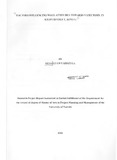| dc.description.abstract | Vasectomy is unique among the modern method of contraception as it enables the male partner to take primary responsibility for fertility control; its availability broadens the choice of methods for family planning users and contributes to promoting male involvement in family planning. This therefore led to the need of undertaking a study of the factors that influence the male attitudes towards vasectomy in Kilifi District. Specifically the study assessed how independent variables like education level, economic factors, cultural and religious factors and reproductive health service providers and had an influence on the male attitudes towards vasectomy in the district which is the dependent variable.
Descriptive survey design was used and a sample of 3 health centers was selected through purposive sampling methods. Reproductive health service providers' and men from different parts of the division formed the study respondents. Questionnaires with both closed and open ended questions were used to collect data as well as an interview guideline. The study findings identified the main factors influencing male attitudes is culture, low education levels, ignorant educated men and health service providers bias,. The study findings recommend vasectomy sensitization campaigns, training of service providers and long term commitment of government, donors and other stakeholders towards vasectomy programs in terms of leadership and resources. | en_US |

